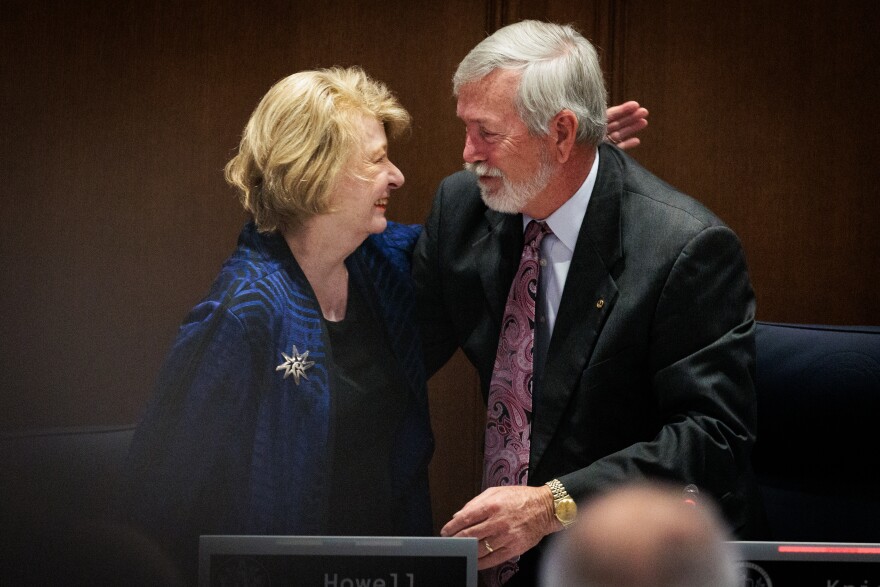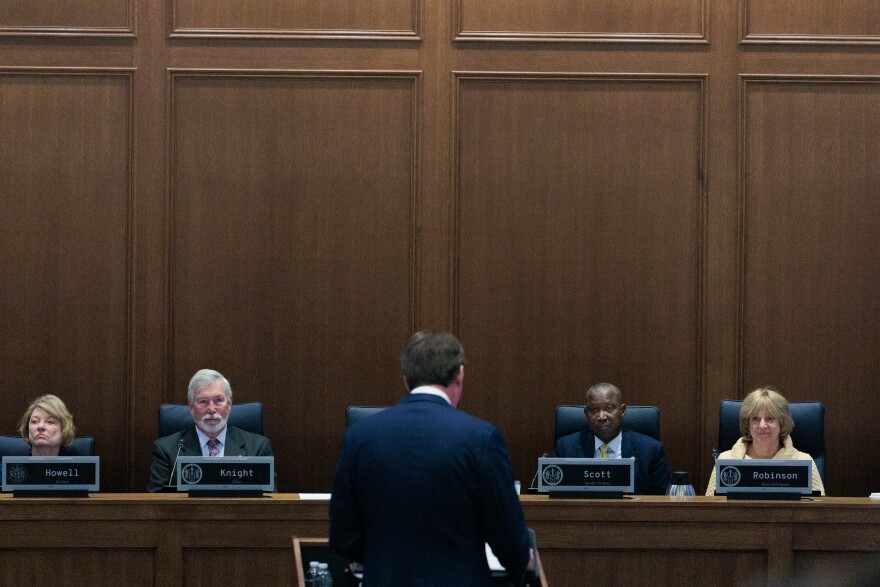Gov. Glenn Youngkin proposed a two-year budget Wednesday that restructures Virginia’s tax base by reducing personal income taxes and offsetting that revenue decrease with a statewide sales tax hike.
The proposed budget, which covers fiscal years 2025 and 2026 (from July 1, 2024, through June 30, 2026), cuts income taxes by 12%.

It also raises the sales and use tax from 4.3% to 5.2% and expands it to digital goods. That change would apply to consumers when paying for streaming, data storage, downloads and usage fees. Purchases by Virginia businesses would be exempt from the tax expansion.
Youngkin said the measure is “closing the big tech tax loophole.”
Income and sales taxes are the largest contributors to Virginia’s general fund revenue. More than two-thirds comes from individual income taxes, and the state sales and use tax regularly account for 17% of revenues, according to the Department of Planning and Budget.
The income tax decrease would reduce tax revenue by $1.1 billion in FY25 and $2.3 billion in FY26. The sales tax changes would raise an additional $720 million in fiscal 25 and $1.8 billion in fiscal 26, mostly through the rate increase. In total, the adjustments would decrease general fund revenues by approximately $1 billion over the two-year budget period.
The administration’s budget projections are also affected by planning for a recession in 2024, making revenue “flattish,” according to the governor. Previous budgets incorporated the risk of an economic downturn by including “contingent appropriations,” meaning the state would avoid spending certain funds if a recession occurred. This budget does not include that language, a Youngkin aide told reporters.
This is Youngkin’s “legacy budget,” in Virginia politics parlance.
“A governor's year-three budget is the last major effort to shape the trajectory of Virginia,” said Stephen Farnsworth, a political science professor at the University of Mary Washington. “For a governor, the proposal is written with an eye to the future of the governor's professional trajectory.”
A range of House Democrats, who will control the chamber come January, responded to Youngkin’s budget proposal in emailed statements Wednesday.
“It is imperative that we have a thorough examination of his proposal,” said Del. Luke Torian (D–Prince William), who will head the House Appropriations Committee. This is the starting point to construct a budget that not only reflects our dedication, but also secures prosperity and fairness for every resident in the Commonwealth.”
Speaker-designee Del. Don Scott (D–Portsmouth) said in a statement that the governor’s proposal would shift the tax burden to lower-income families.
Farnsworth said Democrats’ opinions on the tax policy will matter during negotiations.
“The governor’s budget, when there are Democratic majorities in the House and the Senate, is the bureaucratic equivalent of sitting on Santa’s knee,” he said. “There’s opportunity during the session, of course, for compromise. But this proposal strikes me as being a significant distance from what Democrats would want to see in the next budget.”
Virginia’s tax brackets have not changed since 1990, leading to a system that has middle- and high-income people paying similar state tax rates. In a 2022 report, the General Assembly’s research body noted that recent increases to the standard deduction and the state earned income tax credit have made the tax system more progressive.
Experts consider sales taxes to be regressive, meaning that lower-income people pay a higher percentage of their income in taxes versus the wealthy.

Youngkin said that was considered while crafting the proposal, pointing to an increase in the EITC. The nonrefundable credit would increase from 20% to 25%. Currently, some taxpayers can receive a refund of 15% of the EITC. A fully refundable EITC has been a frequent proposal by Virginia Democrats over the years.
Refunds were part of a compromise amid prolonged negotiations for the budget over the summer. After that budget passed in September, checks were sent out to Virginians in the fall.
Youngkin said “all Virginians will fully participate in this tax reduction.” He also wants to use additional local sales tax to offset local personal property taxes for vehicles, which the governor called “the most hated tax” in Virginia.
“Eliminating it permanently is complicated. Yet, it is a very worthy aspiration. And I do believe it can be done, but only with full cooperation from Democrats and Republicans, House and Senate members, and local and state leaders,” Youngkin said.
Youngkin told lawmakers ending the car tax would be a separate from budget negotiations.

















